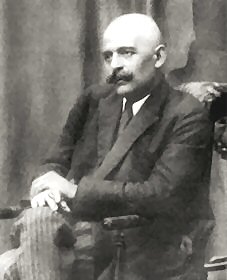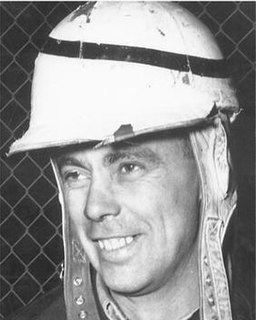A Quote by Swami Vivekananda
How often does a man ruin his disciples by remaining always with them! When men are once trained, it is essential that their leader leave them, for without his absence they cannot develop themselves. Plants always remain small under a big tree.
Related Quotes
This tree is indeed a Tree of Life, for without the higher and finer sentiments man does not life; he merely exists. If any branch of that tree does not bear fruit, the Master tells us that it shall be cut off and cast into the fire. It is the duty of all living things to produce some truly constructive labor as recognition of the divine life which is within them. God is most glorified when His children glorify His spirit within themselves.
All too often we say of a man doing a good job that he is indispensable. A flattering canard, as so many disillusioned and retired and fired have discovered when the world seems to keep on turning without them. In business, a man can come nearest to indispensability by being dispensable in his current job. How can a man move up to new responsibilities if he is the only one able to handle his present tasks? It matters not how small or large the job you now have, if you have trained no one to do it as well, you're not available; you've made your promotion difficult if not impossible.
If there be any man who thinks the ruin of a race of men a small matter, compared with the last decoration and completions of hisown comfort,--who would not so much as part with his ice- cream, to save them from rapine and manacles, I think I must not hesitate to satisfy that man that also his cream and vanilla are safer and cheaper by placing the negro nation on a fair footing than by robbing them.
When Christ was about to leave the world, He made His will. His soul He committed to His father; His body He bequeathed to Joseph to be decently interred; His clothes fell to the soldiers; His mother He left to the care of John; but what should He leave to His poor disciples that had left all for Him? Silver and gold He had none; but He left them that which was infinitely better, His peace.
Ideally a painter (and, generally, an artist) should not become conscious of his insights: without taking the detour through his reflective processes, and incomprehensibly to himself, all his progress should enter so swiftly into the work that he is unable to recognize them in the moment of transition. Alas, the artist who waits in ambush there, watching, detaining them, will find them transformed like the beautiful gold in the fairy tale which cannot remain gold because some small detail was not taken care of.
If we pursue this way, if we are decent, industrious, and honest, if we so loyally and truly fulfill our duty, then it is my conviction that in the future as in the past the Lord God will always help us. In the long run He never leaves decent folk in the lurch. Often He may test them, He may send trials upon them, but in the long run He always lets His sun shine upon them once more and at the end He gives them His blessing.
It is Satan's work to fill men's hearts with doubt. He leads them to look upon God as a stern judge. He tempts them to sin, and then to regard themselves as too vile to approach their heavenly Father or to excite His pity. The Lord understands all this. Jesus assures His disciples of God's sympathy for them in their needs and weaknesses. Not a sigh is breathed, not a pain felt, not a grief pierces the soul, but the throb vibrates to the Father's heart.
It is God's earth out of which man is taken. From it he has his body. His body belongs to his essential being. Man's body is not his prison, his shell his exterior, but man himself. Man does not "have" a body; he does not "have" a soul; rather he "is" body and soul. Man in the beginning is really his body. He is one. He is his body, as Christ is completely his body, as the Church is the body of Christ
A man's character is like his house. If he tears boards off his house and burns them to keep himself warm and comfortable, his house soon becomes a ruin. If he tells lies to be able to do the things he shouldn't do but wants to, his character will soon become a ruin. A man with a ruined character is a shame on the face of the earth.
One of man's important mistakes, one which must be remembered, is his illusion in regard to his I. Man such as we know him, the 'man-machine,' the man who cannot 'do,' and with whom and through whom everything 'happens,' cannot have a permanent and single I. His I changes as quickly as his thoughts, feelings and moods, and he makes a profound mistake in considering himself always one and the same person; in reality he is always a different person, not the one he was a moment ago.





































